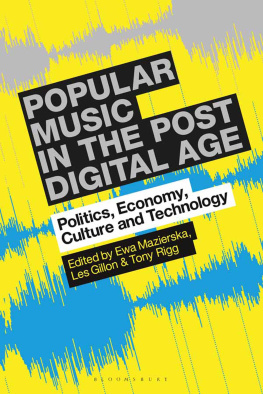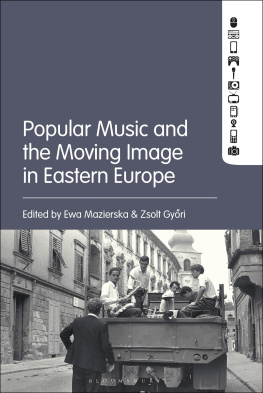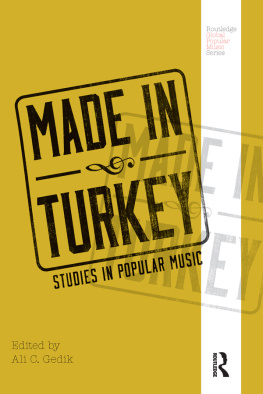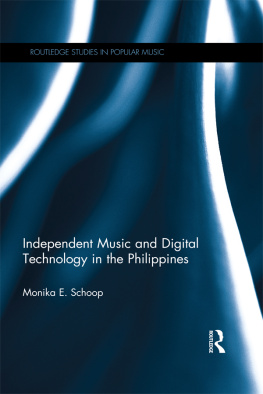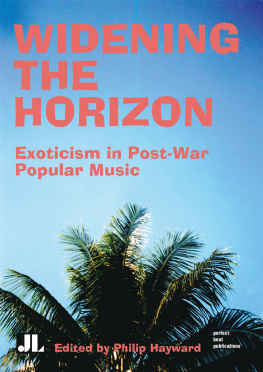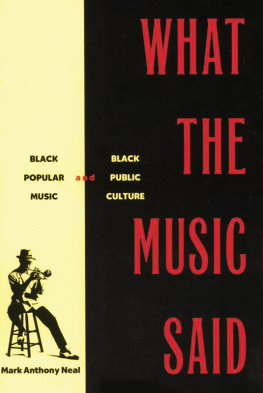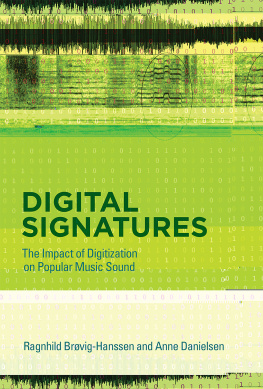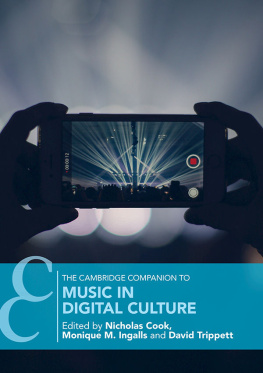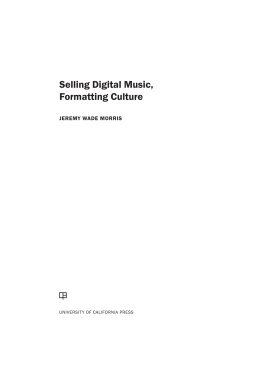
Popular Music in the Post-Digital Age

Contents
Emlia Barna, PhD, is Assistant Professor at the Department of Sociology and Communication, Budapest University of Technology and Economics. Her doctoral thesis (University of Liverpool, 2011) examined the relationship between music scenes, networks and the internet through a case study of contemporary Liverpool indie rock bands. Her main areas of research include the study of popular music scenes and genres, the digital music industries, and popular music, gender and technology. Together with Tams Tfalvy, she recently co-edited the book Made in Hungary: Studies in Popular Music (Routledge, 2017). She is a member of the International Association for the Study of Popular Music (IASPM), former Chair of IASPM Hungary, and an Advisory Board Member for IASPM@Journal.
Lars Brndum, PhD, is a Senior Lecturer in Music at the University of Skvde at the Department of Media, Aesthetics and Narration (School of Informatics). He is also a professional musician and composer, and has performed all around the world. Brndums music often explores the interaction between acoustic and electronic instruments and integration of improvization into through-composed music. He performs live as a solo artist and in several ensemble configurations using analogue modular synthesizers, theremin and effect pedals. His album Fallout (2015) was awarded Best Experimental Music Album at the SOM (Independent Music Labels of Sweden) Manifest Awards. Brndum completed his PhD in Music Theory and Composition at University of Pittsburgh in 1992. He also has a masters degree in Composition and Music Theory (1989) and a Bachelors of Music degree in Guitar Performance (1987) from the Dana School of Music at Youngstown State University. Brndum runs an independent record label, Antennae Media (www.antennaemedia.se).
Mathew Flynn is a lecturer in Music Industry Studies at the University of Liverpool. Before moving into higher education, Mat was a self-employed practitioner in the music industries, owning rehearsal rooms and an independent record label. His research on the music industries was first published in the edited collection Music Entrepreneurship (Bloomsbury Academic, 2016). His other primary area of research is on listening attention paid to music. He has published articles in the journals Kinephanos and The Listening Experience Database exploring the impact of music streaming on listening. In 2017, Mat coordinated the Liverpool section of the UK Live Music Census project. His other research interests include musicians decision-making processes and the digitization of the music industries.
Kenny Forbes is a Lecturer in Commercial Music at the University of the West of Scotland, where he teaches on live music, the digital economy, cultural studies, copyright and creativity. He achieved his doctorate in 2015 at the University of Glasgow, and his thesis reflected on the legendary reputation of the Glasgow Apollo Theatre (197385). Kennys current research projects involve separate studies that focus on playlist recommendations, remix technology and copyright, and Scotlands hidden music heritage.
Andrew Fry runs Sounds et al, a record label and publisher exploring sound, collaboration and curation, based in Portland, OR, and New York, NY. The label has released work from artists including Grasscut, manabu shimada, Ben Glas, Kaori Suzuki, Antlrd and Benot Pioulard, and has organized and promoted events, exhibitions and performances in the USA, Canada, Germany and the UK, including as part of Design Week Portland, and PICAs TBA festival. He worked in the London music industry for nearly a decade, completed his BSc in Music Technology (Audio Systems) at London Metropolitan University, and his MA at London South Bank University, with a final dissertation on Cages 433.
Patryk Galuszka holds a PhD in Management from the University of Lodz, Poland, and an LLM in Law and Economics from Erasmus University Rotterdam, the Netherlands. Currently, he is an Assistant Professor in the Faculty of Economics and Sociology at the University of Lodz. His articles have been published in journals such as International Journal of Communication, International Journal of Cultural Studies, Popular Music, Popular Music and Society, Media, Culture and Society, and Continuum: Journal of Media and Cultural Studies. His research interests include creative industries, popular music studies, and media economics.
Les Gillon, PhD, is a musician and academic based within the School of Journalism Media and Performance at the University of Central Lancashire. In addition to his teaching and practice-based research in music composition and performance, he also writes on visual art and aesthetics. His book on the Turner Prize, The Uses of Reason in the Evaluation of Artworks (Palgrave Macmillan, 2017), explores the rational basis for value judgements in the arts.
Michael Huber is an Associate Professor for Music Sociology at the University of Music and Performing Arts Vienna. His doctoral thesis (Vienna University, 2006) was on the benefits and challenges of sociographical research in urban and rural areas. He is a board member for the Austrian Music Council and the Austrian Music Business Research Association. His research is focused on music reception in the digital age and musical socialization. He has published in German, English, French and Czech, for example, in the Encyclopedia of Music in the Social and Behavioral Sciences.
Chris Inglis is a musicologist based in Cardiff, whose research explores the emergence and development of the electro swing genre. After graduating from the BA (Hons) Music, Technology and Innovation programme at De Montfort University, he has recently completed the MA Musicology programme at the University of Sheffield. As of 2018, he is working on his PhD at the University of South Wales. He was published in Continental Drift, 50 Years of Jazz from Europe, the proceedings of the 2016 Continental Drift conference, held at Edinburgh Napier University. His other research interests include punk and the art of live performance.
Waldemar Kuligowski is Professor at the Department of Ethnology and Cultural Anthropology at Adam Mickiewicz University in Pozna , Poland. He is also an editor-in-chief of Czas Kultury (Time of Culture), a Polish socio-cultural quarterly. He has conducted fieldwork in Poland, Germany, Uzbekistan, Spain, Serbia, Hungary and Albania. His research interests focus on the theory of culture, reflexive ethnography, globalization, and the anthropology of motorway and festivals. He has published in English in Art in Contemporary Cultural Systems. Central and Eastern Europe (Wydawnictwo Nauka i Innowacje, 2014); Sterile and Isolated? An Anthropology Today in Hungary and Poland (Wydawnictwo TIPI, 2015, co-edited with A. Stanisz); and Cultures of Motorway. Localities through Mobility as an Anthropological Issue (Wydawnictwo TIPI, 2016).
Paolo Magaudda is Lecturer in Cultural Sociology at the University of Padova (Italy), where he works with the PaSTIS Research Unit, and Adjunct Lecturer in Sociology of Consumption at the IUSVE University in Venice. His main research interest is the relationship between society, culture and technology, with a specific focus on the history of digital media, the evolution of media consumption practices, and the role of digital music technologies. His most recent books include
Next page
